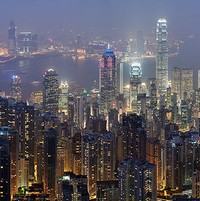Since sovereignty over Hong Kong was returned from Britain to the People’s Republic of China (PRC) on July 1, 1997, the island has maintained the rule of law and civil liberties. Nevertheless, politically and economically, Hong Kong has also experienced some degree of “mainland-ization” under the “one country, two systems” system that frames relations between the Special Administrative Region and Beijing. At the same time, economic integration with the island has resulted in a process of “Hong Kong-ization” of the mainland, if less dramatically. The impact of both phenomena has implications not only for relations between the two, but also for final status scenarios of Taiwan-mainland accommodation and the future of the Greater China space.
The political system in Hong Kong under British rule was semi-colonial, with a governor appointed by the queen of England and a legislature made up of both appointed and elected members. Since the return of Hong Kong’s sovereignty to the PRC, the chief executive has been chosen by an electoral college of elites, while the legislative council is split, with half of its members elected by universal suffrage and the other half by “functional constituencies” representing various interest groups and professional sectors. Many in Hong Kong have continued to demand the right to elect the island’s chief executive and the entire legislative council through universal suffrage. However, Beijing refuses to make significant concessions in either area for fear that Hong Kong’s political system would escape the central government’s control. For Beijing, the possibility of a popularly elected leader in Hong Kong who challenges China’s national security interests is unacceptable. Moreover, Beijing is reluctant to allow the people of Hong Kong to directly elect all legislators for fear that the Legislative Council would be controlled by the pan-democratic parties, who in addition to pushing for universal suffrage also tend to adopt liberal stances on various policy issues.
As a result, Hong Kong’s political reform is destined to be influenced, shaped and vetoed by Beijing for the near future, and not just because having a SAR governed by a Western-style democratic model would be tantamount to a revolutionary model in mainland China. Such a development would also have implications for how Beijing might eventually deal with Taiwan, not to mention demands for autonomy in Tibet and Xinjiang. In other words, Hong Kong is too politically important to the mainland for Beijing to leave its future up to Hong Kong voters.

